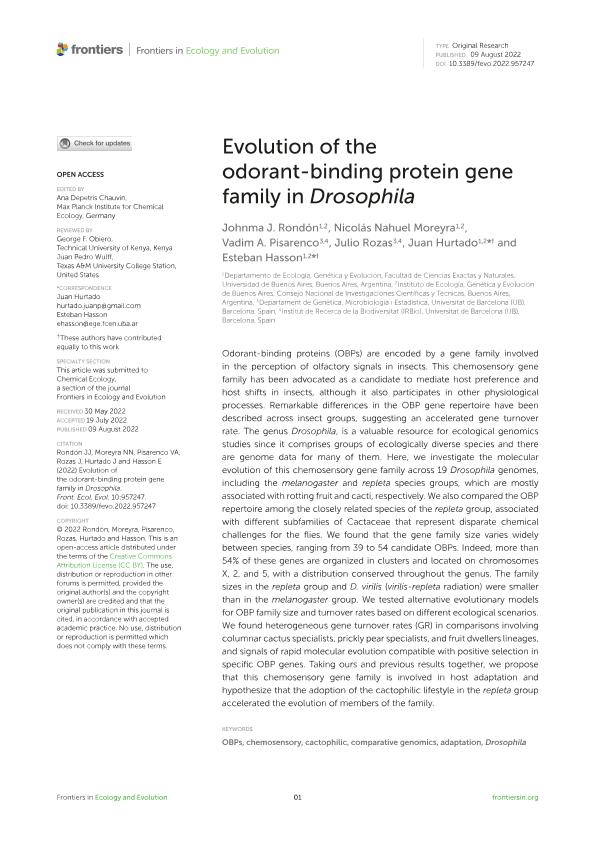Mostrar el registro sencillo del ítem
dc.contributor.author
Rondón Guerrero, Johnma José

dc.contributor.author
Moreyra, Nicolás Nahuel

dc.contributor.author
Pisarenco, Vadim A.
dc.contributor.author
Rozas, Julio
dc.contributor.author
Hurtado, Juan Pablo

dc.contributor.author
Hasson, Esteban Ruben

dc.date.available
2023-09-28T17:58:59Z
dc.date.issued
2022-08
dc.identifier.citation
Rondón Guerrero, Johnma José; Moreyra, Nicolás Nahuel; Pisarenco, Vadim A.; Rozas, Julio; Hurtado, Juan Pablo; et al.; Evolution of the odorant-binding protein gene family in Drosophila; Frontiers Media; Frontiers in Ecology and Evolution; 10; 8-2022; 1-14
dc.identifier.uri
http://hdl.handle.net/11336/213477
dc.description.abstract
Odorant-binding proteins (OBPs) are encoded by a gene family involved in the perception of olfactory signals in insects. This chemosensory gene family has been advocated as a candidate to mediate host preference and host shifts in insects, although it also participates in other physiological processes. Remarkable differences in the OBP gene repertoire have been described across insect groups, suggesting an accelerated gene turnover rate. The genus Drosophila, is a valuable resource for ecological genomics studies since it comprises groups of ecologically diverse species and there are genome data for many of them. Here, we investigate the molecular evolution of this chemosensory gene family across 19 Drosophila genomes, including the melanogaster and repleta species groups, which are mostly associated with rotting fruit and cacti, respectively. We also compared the OBP repertoire among the closely related species of the repleta group, associated with different subfamilies of Cactaceae that represent disparate chemical challenges for the flies. We found that the gene family size varies widely between species, ranging from 39 to 54 candidate OBPs. Indeed, more than 54% of these genes are organized in clusters and located on chromosomes X, 2, and 5, with a distribution conserved throughout the genus. The family sizes in the repleta group and D. virilis (virilis-repleta radiation) were smaller than in the melanogaster group. We tested alternative evolutionary models for OBP family size and turnover rates based on different ecological scenarios. We found heterogeneous gene turnover rates (GR) in comparisons involving columnar cactus specialists, prickly pear specialists, and fruit dwellers lineages, and signals of rapid molecular evolution compatible with positive selection in specific OBP genes. Taking ours and previous results together, we propose that this chemosensory gene family is involved in host adaptation and hypothesize that the adoption of the cactophilic lifestyle in the repleta group accelerated the evolution of members of the family.
dc.format
application/pdf
dc.language.iso
eng
dc.publisher
Frontiers Media

dc.rights
info:eu-repo/semantics/openAccess
dc.rights.uri
https://creativecommons.org/licenses/by/2.5/ar/
dc.subject
ADAPTATION
dc.subject
CACTOPHILIC
dc.subject
CHEMOSENSORY
dc.subject
COMPARATIVE GENOMICS
dc.subject
DROSOPHILA
dc.subject
OBPS
dc.subject.classification
Biología

dc.subject.classification
Ciencias Biológicas

dc.subject.classification
CIENCIAS NATURALES Y EXACTAS

dc.title
Evolution of the odorant-binding protein gene family in Drosophila
dc.type
info:eu-repo/semantics/article
dc.type
info:ar-repo/semantics/artículo
dc.type
info:eu-repo/semantics/publishedVersion
dc.date.updated
2023-07-07T22:18:52Z
dc.identifier.eissn
2296-701X
dc.journal.volume
10
dc.journal.pagination
1-14
dc.journal.pais
Suiza

dc.journal.ciudad
Lausana
dc.description.fil
Fil: Rondón Guerrero, Johnma José. Consejo Nacional de Investigaciones Científicas y Técnicas. Oficina de Coordinación Administrativa Ciudad Universitaria. Instituto de Ecología, Genética y Evolución de Buenos Aires. Universidad de Buenos Aires. Facultad de Ciencias Exactas y Naturales. Instituto de Ecología, Genética y Evolución de Buenos Aires; Argentina. Universidad de Buenos Aires. Facultad de Ciencias Exactas y Naturales. Departamento de Ecología, Genética y Evolución; Argentina
dc.description.fil
Fil: Moreyra, Nicolás Nahuel. Consejo Nacional de Investigaciones Científicas y Técnicas. Oficina de Coordinación Administrativa Ciudad Universitaria. Instituto de Ecología, Genética y Evolución de Buenos Aires. Universidad de Buenos Aires. Facultad de Ciencias Exactas y Naturales. Instituto de Ecología, Genética y Evolución de Buenos Aires; Argentina. Universidad de Buenos Aires. Facultad de Ciencias Exactas y Naturales. Departamento de Ecología, Genética y Evolución; Argentina
dc.description.fil
Fil: Pisarenco, Vadim A.. Universidad de Barcelona; España
dc.description.fil
Fil: Rozas, Julio. Universidad de Barcelona; España
dc.description.fil
Fil: Hurtado, Juan Pablo. Consejo Nacional de Investigaciones Científicas y Técnicas. Oficina de Coordinación Administrativa Ciudad Universitaria. Instituto de Ecología, Genética y Evolución de Buenos Aires. Universidad de Buenos Aires. Facultad de Ciencias Exactas y Naturales. Instituto de Ecología, Genética y Evolución de Buenos Aires; Argentina. Universidad de Buenos Aires. Facultad de Ciencias Exactas y Naturales. Departamento de Ecología, Genética y Evolución; Argentina
dc.description.fil
Fil: Hasson, Esteban Ruben. Consejo Nacional de Investigaciones Científicas y Técnicas. Oficina de Coordinación Administrativa Ciudad Universitaria. Instituto de Ecología, Genética y Evolución de Buenos Aires. Universidad de Buenos Aires. Facultad de Ciencias Exactas y Naturales. Instituto de Ecología, Genética y Evolución de Buenos Aires; Argentina. Universidad de Buenos Aires. Facultad de Ciencias Exactas y Naturales. Departamento de Ecología, Genética y Evolución; Argentina
dc.journal.title
Frontiers in Ecology and Evolution
dc.relation.alternativeid
info:eu-repo/semantics/altIdentifier/url/https://www.frontiersin.org/articles/10.3389/fevo.2022.957247/full
dc.relation.alternativeid
info:eu-repo/semantics/altIdentifier/doi/http://dx.doi.org/10.3389/fevo.2022.957247
Archivos asociados
